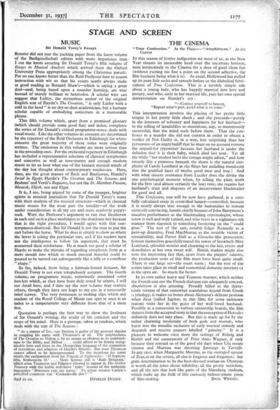THE CINEMA
"True Confession." At the Plaza—"Amphitryon." At the Curzon IN this season of festive indigestion we most of us, as the New Year thrusts its inexorable head over the uncertain horizon, turn instinctively to the Cinema for a dose of good clean fun (without putting too fine a point on the second adjective, the film business being what it is). As usual, Hollywood has pulled up its pure lisle socks and spreads before us the diabolical fabri- cations of True Confession. This is a terribly simple tale about a young lady, who has happily married into love and penury, and who, early in her married life, puts her own special interpretation on Hamlet's cry :
"—Confess yourself to heaven, "Repent what's past, avoid what is to come."
This interpretation involves the placing of her pretty little tongue in her pretty little cheek ; and she proceeds—purely
in the interests of solvency and happiness for her husband—
to the telling of taradiddles so monstrous, nay, so monstrously successful, that the mind reels before them. That she con- fesses to a murder she did not commit in order to obtain a verdict of Not Guilty is, in a way, less surprising than her persuasion of an angry bailiff that he must on no account remove the unpaid-for typewriter because her husband is under the delusion that it is their baby, which died last year. Yet all the while "her modest looks the cottage might adorn," and how sweetly like a primrose beneath the thorn is the natural sim- plicity of Carole Lombard as she flings her unfailing mendacity into the gratified faces of twelve good men and true I And with what sincere assistance from Lucifer does she divine the one psychological moment when, by telling the plain truth for the first (and almost certainly the last) time, she regains her husband's trust and disposes of an inconvenient blackmailer for good and all.
True Confession, you will by now have gathered, is a care- fully calculated essay in controlled lunacy—controlled, because it is nearly always true enough to the humanities to remain curiously convincing, lunatic chiefly because of John Barrymore's macabre performance as the blackmailing criminologist, whose screw is well and truly turned, and who veers in a nightmare-ish manner from slapstick to something bordering on the " could grue." The rest of the cast, notably Edgar Kennedy as a pent-up detective, Fred MacMurray as the amiable victim of connubiality, and Porter Hall as a Groucho-like prosecutor, festoon themselves gracefully round the tower of lies which Miss Lombard, splendide mendax and charming to the last, erects and demolishes at her own sweet will. British studios might also note the interesting fact that, apart from the players' salaries, the production costs of this film must have been quite small. There is one large set—the court scene ; but the rest of the action takes place in small and economical domestic interiors cr in the open air. So much the better.
In its own rather heavy and Teutonic manner, which neither the French cast nor the French dialogue can adequately conceal, Amphitryon is also amusing. Proudly billed as the thirty- ninth version of that somewhat scandalous legend from Greek ythology, it makes no bones about Alcmena's delicate position when Zeus (called Jupiter, in this film, for some unknown reason) visits her in the guise of her well-loved husband.
Possibly as a concession to various censorship boards, the film departs from the accepted story in that the conception of Hercules definitely does not take place. But this is made up for by the rather charming modernity of both gods and mortals, who burst into the metallic recitative of early musical comedy and despatch and receive prayers labelled " priority." It is a pleasure to welcome once more the settings of Rohrig and Herlth and the camerawork of Fritz Arno Wagner, if only because they remind us of the good old days when Ufa meant cinema and Murnau was directing Jannings in Tartuffe. In any case, when Marguerite Moreno, as the outraged spouse of Zeus, is on the screen, all else is forgiven and forgotten; her grim determination to be the best-dressed woman on Olympus is worth all the jokes about infidelity, all the pretty madchens,
and all the sets that look like parts of the Niirnberg stadium, which make up the bulk of this curiously indeterminate piece
































 Previous page
Previous page